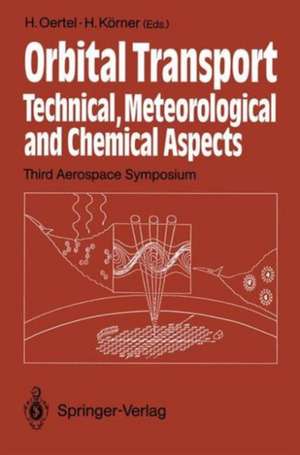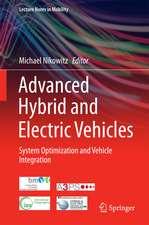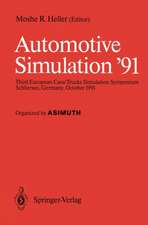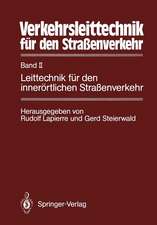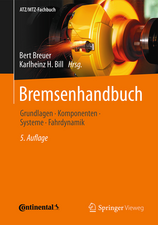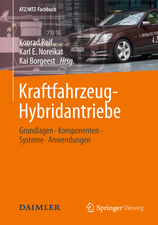Orbital Transport: Technical, Meteorological and Chemical Aspects Third Aerospace Symposium, Braunschweig 26.–28. August 1991
Editat de H. jr. Oertel, H. Körneren Limba Engleză Paperback – 18 apr 2012
Preț: 650.19 lei
Preț vechi: 764.93 lei
-15% Nou
Puncte Express: 975
Preț estimativ în valută:
124.41€ • 129.90$ • 102.97£
124.41€ • 129.90$ • 102.97£
Carte tipărită la comandă
Livrare economică 05-19 aprilie
Preluare comenzi: 021 569.72.76
Specificații
ISBN-13: 9783642457227
ISBN-10: 3642457223
Pagini: 496
Ilustrații: XVIII, 474 p.
Dimensiuni: 155 x 235 x 26 mm
Greutate: 0.69 kg
Ediția:Softcover reprint of the original 1st ed. 1993
Editura: Springer Berlin, Heidelberg
Colecția Springer
Locul publicării:Berlin, Heidelberg, Germany
ISBN-10: 3642457223
Pagini: 496
Ilustrații: XVIII, 474 p.
Dimensiuni: 155 x 235 x 26 mm
Greutate: 0.69 kg
Ediția:Softcover reprint of the original 1st ed. 1993
Editura: Springer Berlin, Heidelberg
Colecția Springer
Locul publicării:Berlin, Heidelberg, Germany
Public țintă
ResearchCuprins
Session 1 Orbital Transport.- The German Space Program.- BMFT — Hypersonic Technology Programs.- Orbital Transport Systems.- The European Hermes Program.- Environmental Aspects of Orbital Transport.- Session 2 High Temperature Aspects.- Hypersonic Technology Experimental Vehicles.- High Temperature Aspects of the European Hermes Programme.- The Aerothermodynamic Validation Reentry Experiment HYPERBA.- An Integrated Computer-Program-System for the Preliminary Design of Advanced Hypersonic Aircraft (PrADO-Hy).- Design Optimization of an Airbreathing Aerospaceplane.- Integrated Thermal and Mechanical Analysis of Hypersonic Vehicles by Using Adaptive Finite Element Methods.- Local Implicit Solvers for the Calculation of Hypersonic Reactive Flow Fields.- Estimation of Aerodynamic Derivatives: Euler Scheme Validation and Approximate Methods for Hypersonic Configurations.- Verification of Engineering Methods of Aerodynamics for Reentry Vehicles by DSMC.- Numerical Modelling and Simulation of Chemically Reacting Reentry Flows.- Simulation of Hypersonic Flows Using Detailed Reaction and Transport Models.- Modelling of Chemical and Physical Effects with Respect to Flows Around Reentry Bodies.- Fundamental Investigation on Post-Shock Thermodynamic Nonequilibrium Effects of Air including lonization.- The High Enthalpy Shock Tunnel in Göttingen (HEG).- Session 3 Flight Mechanics and Control Systems.- Precision Navigation for Reentry Vehicles.- SpaceNav — A High Accuracy Navigation System for Space Applications.- Reentry Trajectories and Their Optimization by an Evolution Algorithm.- Aerodynamics of Delta Wings with Application to High-Alpha Flight Mechanics.- Optimal Separation and Ascent of Lifting Upper Stages.- Trim Conditions for Optimal Flight Performance of HypersonicAircraft.- Handling Qualities of Hypersonic Aircraft and Related Control Requirements.- Real-Time Models for the Calculation of the Aerodynamic of Aircrafts with Delta Wings.- Low-Speed Aerodynamics Characteristics of a Slender Wing with Vertical Fins.- Session 4 Dynamics; Chemistry and Environmental Aspects.- Meteorological Aspects of Environmental Problems.- Chemistry on the Stratosphere.- Transition to Turbulence in Internal Gravity Waves at Stratospheric and Mesopheric Heights.- Influence of the Flight Trajectory on the Exhaust Gas Composition of a H2 -Fueled Air-Breathing Ramjet Engine.- Modelling of Plume Chemistry of High Flying Aircraft with H2 Combustion Engines.- Thermal Decomposition of Peroxynitrates.- Effects of Chlorine from Solid-Fueled Rockets and from Halocarbons on Atmospheric Chemistry.- Photochemical Model Calculations About Environmental Effects of Hydrogen Engines.
